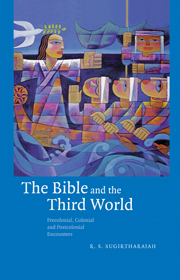Book contents
- Frontmatter
- Contents
- Acknowledgements
- 1 Introduction
- PART I PRECOLONIAL RECEPTION
- PART II COLONIAL EMBRACE
- 2 White men bearing gifts: diffusion of the Bible and scriptural imperialism
- 3 Reading back: resistance as a discursive practice
- 4 The colonialist as a contentious reader: Colenso and his hermeneutics
- 5 Textual pedlars: distributing salvation – colporteurs and their portable Bibles
- PART III POSTCOLONIAL RECLAMATIONS
- Afterword
- Select bibliography
- Index of biblical references
- Index of names and subjects
3 - Reading back: resistance as a discursive practice
Published online by Cambridge University Press: 02 December 2009
- Frontmatter
- Contents
- Acknowledgements
- 1 Introduction
- PART I PRECOLONIAL RECEPTION
- PART II COLONIAL EMBRACE
- 2 White men bearing gifts: diffusion of the Bible and scriptural imperialism
- 3 Reading back: resistance as a discursive practice
- 4 The colonialist as a contentious reader: Colenso and his hermeneutics
- 5 Textual pedlars: distributing salvation – colporteurs and their portable Bibles
- PART III POSTCOLONIAL RECLAMATIONS
- Afterword
- Select bibliography
- Index of biblical references
- Index of names and subjects
Summary
In this modern world three nations above all others have known the Bible best: Germany, Great Britain, and the United States of America.
Ernest Sutherland BatesHave we a single chapter in the Bible written by an European?
Goodwill Toward MenWhen faced with colonial interpretation, the colonized resorted to two discursive practices – resistance and assimilation. Both provided a convenient entry for the colonized to engage in debate. Resistance has been theorized mostly in terms of opposition between Europe and its ‘Other’. Edward Said amplifies the idea of resistance to include also political and scholarly activities. In his work Culture and Imperialism, he speaks of two types of resistance – territorial and cultural. He sees the armed struggle against the invader as primary, and the ideological as secondary. Resistance, in his view, is a ‘rediscovery and repatriation of what had been suppressed in the natives’ past by the process of imperialism'. Seen within the colonial context, resistance meant not simply a repudiation or rejection of Western rule or Western discursive practices. Rather, it was a profitable use of a paradigm provided by the colonizer, in that it was successfully turned against him. What the discourse of resistance achieved was to make certain that the debate was not weighted towards the colonizer. It helped to establish cultural differences and to affirm an identity within the discursive territory of the imperialists.
This resistance spilled over into the arena of colonial biblical interpretation.
- Type
- Chapter
- Information
- The Bible and the Third WorldPrecolonial, Colonial and Postcolonial Encounters, pp. 74 - 109Publisher: Cambridge University PressPrint publication year: 2001

